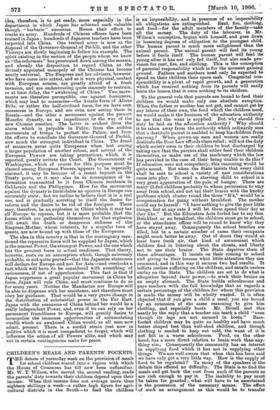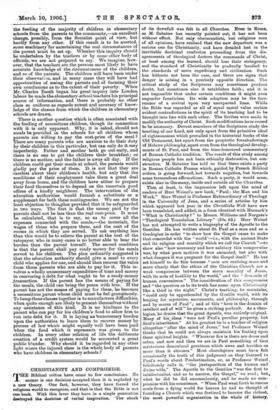CHILDREN'S MEALS AND PARENTS' POCKETS. T HE debate of yesterday week
on the provision of meals for school children soared into a region with which the House of Commons has till now been unfamiliar. Mr. W. T. Wilson, who moved the second reading, made the parents' duty towards their children depend upon their income. When that income does not average more than eighteen shillings a week—a rather high figure for agri- cultural districts in the South—to feed the children is an impossibility, and in presence of an impossibility all obligations are extinguished. Rent, fire, clothing, and food—for the adult members of the family—take all the money. The duty of the labourer, in Mr. Wilson's conception, begins with himself, and goes down in lessening degrees of obligation to the youngest child. The human parent is much more enlightened than the animal parent. The animal parent will feed its young before it feeds itself. The human parent will feed its young after it has not only fed itself, but also made pro- vision for rent, fire, and clothing. This is the conception of parental responsibility which is for the moment gaining ground. Fathers and mothers need only be expected to spend on their children their spare cash. Congenital irre- sponsibility is a plant of rapid growth, and a generation which has received nothing from its parents will easily learn the lesson that it owes nothing to its children.
To the general rule that parents are bound to feed their children we would make only one absolute exception. When the father or mother has not got, and cannot get by any labour of their own, the food which the children need, we would make it the business of the education authority to see that the want is supplied. But why should this duty be laid on the ecrucation authority ? Why should it be taken away from the authority which ordinarily sees that a destitute parent is enabled to keep his children from starving ? When grown-up men and women are really destitute the Poor Law affords them relief ; will not the duty which society owes to their children be best discharged' by taking care that the parents shall either feed their children themselves, or make use of the machinery which the law has provided in the case of their being unable to do this ? If education were not compulsory, this reasoning would be quite sound. But when the State insists that every child_ shall be sent to school a variety of new considerations come into play. To send a starving child to school is a very great aggravation of the pain of hunger. There are many ill-fed children probably to whom permission to stay away from school, and not tax their brains with the knotty problems which cluster round the three "R's," would be a compensation for going without breakfast. The mother could say to herself : "I have nothing to give the poor little e but at any rate I will let them spend their day as they like." But the Education Acts forbid her to say this. Breakfa,st or no breakfast, the children must go to school, or the attendance officer will be round to know why they have stayed away. Consequently the school benches are filled, but in a certain number of cases their occupants might much better be away. Out of doors they would at least have fresh air, that kind of amusement which children find in loitering about the streets, and liberty not to use their brains. The State deprives them of these advantages. It insists on their coming to school and giving to their lessons what little attention they can command, and in this way it secures two bad results. It inflicts useless suffering on the children, and entails useless outlay on the State. The children are set to do what is altogether beyond their power,—to work their brains on an empty stomach. The State builds schoolrooms and pays teachers with the full knowledge that as regards a certain percentage of the children for whom this provision is made the money will be wholly wasted. It is often objected that if you give a child a meal, you are bound by an extension of the same reasoning to give him clothing, and especially boots. Mr. Birrell met this neatly by the reply that a teacher can teach a child "even though its legs are not encased in boots." Bare- footed children may be quite as healthy and have much better shaped feet than well-shod children, and though clothing is needed to keep out cold, the want of it is not felt in a warm schoolroom. Food, on the other baud, has a more direct relation to brain-work than any- thing else. Consequently the community has an interest in supplying food which it has not in supplying other things. We are well aware that when this has been said we have only got a very little way. How is the supply of food to be regulated ? To many of the speakers in the debate this offered no difficulty. The State is to find the meals and get back the cost from such of the parents as are rich enough to pay it. The inability to pay must be taken for granted.•' what will have to be ascertained is the possession of the necessary means. The effect of such an arrangement as this would be to transfer the feeding of the majority of children in elementary schools from the parents to the community,—an excellent change, possibly, from the Socialist point of view, but hardly from any other. If this result is to be averted, some machinery for ascertaining the real circumstances of the parent must be set up. Whether this inquiry should be undertaken by the teachers or by some other body of officials, we are not prepared to say. We imagine, how- ever, that the teachers are the persons most likely to have accurate knowledge of the circumstances of the children, and so of the parents. The children will have been under their observation, and in many cases they will have had opportunities of seeing the parents and of forming their own conclusions as to the extent of their poverty. When Mr. Charles Booth began his great inquiry into London labour he made the elementary-school teachers his principal source of information, and there is probably no other class so uniform as regards extent and accuracy of know- ledge of the classes from which the children in elementary schools are drawn.
There is another question which is often associated with the feeding of necessitous children, though its connection with it is only apparent. Why, it is asked, should not meals be provided in the schools for all children whose parents are willing to pay the cost-price of the meal ? There are many parents who are anxious to do their duty by their children in this particular, but can only do it very imperfectly. Father and mother both go out early, and there is no one to get the children their breakfast; or there is no mother, and the father is away all day. If the children could get their meals at school, the parents would gladly pay the price of them. It is not that they are careless about their children's health, but only that the conditions of their employment take them a great deal away from home, and the children have either to prepare their food themselves or to depend on the uncertain good offices of a kindly neighbour. The intervention of the education authorities would furnish a substitute or a supplement for both these contingencies. We see not the least objection to this.plan provided that it be safeguarded in two ways. The first is that the money paid by the parents shall not be less than the real cost-price. It must be calculated, that is to say, so as to cover all the expenses connected with the meals,—the materials, the wages of those who prepare them, and the rent of the rooms in which they are served. To ask anything less than this would be to relieve the parent at the cost of the ratepayer, who in many cases is no better able to bear the burden than the parent himself. The second condition is that the parent shall pay ready money for the meals served to his children. The plan ordinarily suggested is that the education authority should give a meal to every child who applies for one, and should then recover the value from those parents who are able to pay for it. This in- volves a wholly unnecessary expenditure of time and money in recovering a debt for what ought to be a ready-money ransaction. If the parent has the means of paying for the meals, the child can bring the pence with him. If the parent has not the means of paying for them, he becomes a necessitous parent whose child must be fed gratlitously. To lump these classes together is to manufacture difficulties, when quite enough are likely to present themselves without any assistance of this kind. It is no kindness to the parent who can pay for his children's food to allow him to run into debt for it. It is laying an tnnecessary burden upon the authorities to leave them to recover money by process of law which might equally well have been paid when the food which it represents was given to the children. In every other relation of life the deliberate creation of a credit system would be accounted a great public blunder. Why should it be regarded in any other light where the injured class is the whole body of parents who have children in elementary schools ?*











































 Previous page
Previous page